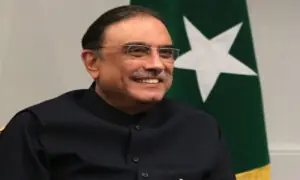Canada has ‘political compulsion’ to blame India for murder of Sikh separatist: New Delhi
3 min readCanada’s investigation into alleged Indian involvement in the killing of a Sikh separatist in Vancouver last year is a “political compulsion”, New Delhi’s foreign minister said after three Indian citizens were arrested over the killing.
Canadian police on Friday arrested the trio for the murder of Hardeep Singh Nijjar, saying they were investigating their links to the Indian government, “if any”.
The killing sent diplomatic relations between Ottawa and New Delhi into a tailspin last autumn after Prime Minister Justin Trudeau said there were “credible allegations” linking Indian intelligence to the crime.
India vehemently rejected the allegations and deemed them “absurd”, halting the processing of visas and forcing Canada to reduce its diplomatic presence in the country significantly.
“It is their political compulsion in Canada to blame India,” The Press Trust of India news agency quoted external affairs minister S Jaishankar as saying on Saturday.
Thousands of people were killed in the 1980s during a separatist insurgency aimed at creating a Sikh homeland known as Khalistan, which was put down by security forces.
The movement has largely petered out within India, but in the Sikh diaspora — whose largest community is in Canada, with around 770,000 people — it retains support among a vocal minority.
New Delhi has sought to persuade Ottawa not to grant Sikh separatists visas or political legitimacy, Jaishankar said, since they are “causing problems for them (Canada), for us and also for our relationship”.
He added that Canada does not “share any evidence with us in certain cases, police agencies also do not cooperate with us”.
Nijjar immigrated to Canada in 1997 and acquired citizenship 18 years later. He was wanted by Indian authorities for alleged terrorism and conspiracy to commit murder.
The three arrested Indian nationals, all in their twenties, were charged with first-degree murder and conspiracy.
They were accused of being the shooter, driver and lookout in his killing last June. The Canadian police said they were aware that “others may have played a role” in the murder.
In November, the US Justice Department charged an Indian citizen living in the Czech Republic with plotting a similar assassination attempt on another Sikh separatist leader on American soil.
A Washington Post investigation reported last week that Indian foreign intelligence officials were involved in the plot, a claim rejected by New Delhi.
Canada PM hails ‘rule of law’
Meanwhile, Prime Minister Justin Trudeau on Saturday acknowledged fear in Canada’s Sikh community but underscored the “rule of law”.
Speaking Saturday at a gala in Toronto to celebrate Sikh heritage and culture, Trudeau acknowledged that many in Canada’s Sikh community are “feeling uneasy, and perhaps even frightened right now,” but urged faith in the justice system.
“Let us remain calm and us remain steadfast in our commitment to our democratic principles and our system of justice,” he said.
Trudeau said the arrests were “important because Canada is a rule of law country with a strong and independent justice system, as well as a fundamental commitment to protecting all its citizens.”
For the latest news, follow us on Twitter @Aaj_Urdu. We are also on Facebook, Instagram and YouTube.

























Comments are closed on this story.